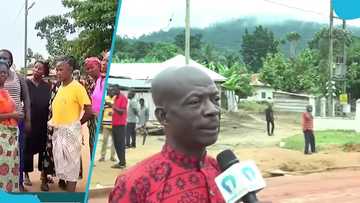Farmers in Okere District Face Dire Challenges Due to Bad Road Infrastructure
- Farmers and traders in Okere District are grappling with deteriorating road conditions that hinder their access to markets and affect their livelihoods
- The poorly maintained roads, full of potholes and gullies, have forced residents to endure costly transport challenges
- Local leaders and residents are urgently calling on the government to prioritize road repairs to support the district's farming and economic growth
Ghana’s top stories, now easier to find. Discover our new search feature!
Okere District is one of the 33 districts in the Eastern Region. It was carved from Akuapem-North in 2018, making it the newest district in the region.
Communities in the southern part of the district are heavily engaged in farming. These farming communities predominantly grow staple crops such as corn, plantain, cassava, oranges, tomatoes, and green pepper, among others.

Source: UGC
Residents in this part, especially women, are mainly involved in the processing of cassava dough.
One of its major roads that connects communities, including Dawu Sanfo, Asasekoko, Baware, and Bewase, is in a very deplorable state.
Trucks, lorries, and motorcycles traverse this road day and night, transporting goods and people to markets in the Akuapem North town of Adawso and the regional capital, Koforidua.
For motorists, plying the road remains a difficult task, which they say has a heavy toll on their transport business.
The road is full of gullies and potholes, and it becomes muddy and impassable whenever it rains.
Okere drivers share frustrations with bad roads
Drivers complain that they often get stuck when they use the road, forcing them to abandon it, thereby ignoring farmers and their farm produce.
Motorists who take the risk of using the road and transporting goods to the market charge farmers and traders exorbitantly.
One of the women, Adjzo Amesi, who processes cassava dough and is most affected, expresses dissatisfaction with the current state of the road.
She said that getting their produce to the market has become a difficult hurdle to overcome.
“Sometimes it takes a lot of time to get the truck drivers. When they finally agree to transport our goods, they charge more than expected,” she said.
“We cannot stop doing this work. This is our livelihood. This is what puts food on our kitchen table, clothes our children, and pays our bills. We ask the president to look in our direction and construct our road for us. That’s all we need from him now,” she added.
Farmer in Okere laments poor road networks
While plying the road one rainy morning, a vegetable farmer, Amanor William, was seen cautiously riding a tricycle through the sticky muddy road en route from Asasekoko.
Mr. Amanor is a farmer, but this is not his community. About a year ago, he and other colleagues moved from Begoro in the Fanteakwa District to farm vegetables. The poor road infrastructure in the area remains their biggest challenge.
When the road was better, they spent less to manage their farms in terms of transportation. Motorists now charge double what they used to charge to reach their farms.
“The road wasn’t like this before when we came. It was not perfect, but it was better than what we see today. Now, traders do not come to the farm as they used to; we have to transport the produce to them. We incur additional costs doing that. The land here is good. We plead with the government to fix the roads so we can continue farming,” Mr. Amanor said.
Another farmer, Wofa Yirenkyi, who is a resident of the community and has been farming since he was 18, describes the scale of crops they produce for the market and how their roads have been neglected by successive governments.
He explains that their lives have been full of struggles: the ordeal of farming and getting the crops to buyers.
“It took us years of begging the then MP, Daniel Kwaku Botwe, to fix our roads. The contractor began work in 2021. We were happy, but our joy was short-lived. The contractor evacuated his equipment and left the site, leaving the road in a worse state than before. Now, all we pray for is a good road. How do we transport our goods, and how do we go to the hospital when we fall sick? Cars no longer ply the road as they used to,” he said.

Source: Original
Okere residents lament poor state of roads
A resident of Dawu Sanfo, Mary Asabea, laments that the state of the road has hindered development in the area.
She narrates how she was once stranded away from her home.
“It had rained that evening when I was returning from Koforidua. The road was so muddy that the riders refused to use it. I had to spend the night at a friend’s house. Imagine if I had been sick and needed to be transported to a medical facility. I could have died,” Asabea lamented.
Local traders, who used to sell detergents and kitchen staples, have abandoned their businesses as moving from one community to another has become problematic due to the condition of the road.
A hawker who defies the odds shared her experience, saying simply, “It’s hard to reach customers.”
“It’s difficult to navigate through to our customers, but I still need to reach them despite the difficulties just to make ends meet. It’s really hard, I must say. We only need one thing: fixing the road.”
GES staff and business owners badly affected
The worrying situation not only affects farmers and traders but also teachers working in the various schools in the communities.
A teacher from the Ghana Education Service (GES), who prefers to remain anonymous for safety reasons, described the dangers of riding pillion on the road to work.
“The road becomes very bad, especially during the rainy season, such that sometimes we skip school, not because we want to, but for our safety. I was with a colleague on a bike. The bike skidded, and we found ourselves in the muddy water, with the bike’s exhaust tearing my flesh. Again, the transport fare alone doesn’t encourage you to go to work.”

Read also
Madina Redco fire destroys shop of loan-backed trader, victim begs Nana Ama McBrown for support
A commercial motorcycle rider, known locally as Fiko, explained that they spend a lot maintaining their motorcycles, which is why they charge hefty fares.
“We wish we could lower the fares, but we can’t. We have to regularly visit the washing bay and service our machines to stay in business. Ordinarily, no reasonable rider would charge a passenger GHS30.00 for a distance of less than five kilometres. Elsewhere, the same distance riders are charging between five to ten cedis.”
Okere assembly says road would be fixed
The approximately 20-kilometre road, which was awarded for construction in 2021, was soon abandoned after drains were completed halfway.
The assemblyman for the area, Godwin Sika Avorshie, who described the road as a death trap, says plans are underway to get contractors back on-site.
He informs YEN.com.gh that the road has been captured in the assembly’s 2025 budget and is hopeful that once the budget is approved, the contractor will return to resume work.
“I have not given authorities rest over this project. It’s really become a death trap. We produce a lot of farm produce for Adawso, Madina, and Koforidua markets, but we have very little to show in terms of road infrastructure,” Mr. Avorshie said.

Source: Facebook
Gov't to construct roads in over 160 districts
Meanwhile, YEN.com.gh reported that Kwame Governs Agbodza said that the government of President John Mahama would build 5,000km of roads in over 160 districts across Ghana.
The project aimed to improve trade and investment under John Mahama's Big Push Programme.
Abandoned roads from Akufo-Addo’s era were also to be completed with new Finance Ministry authorisations.
Source: YEN.com.gh







